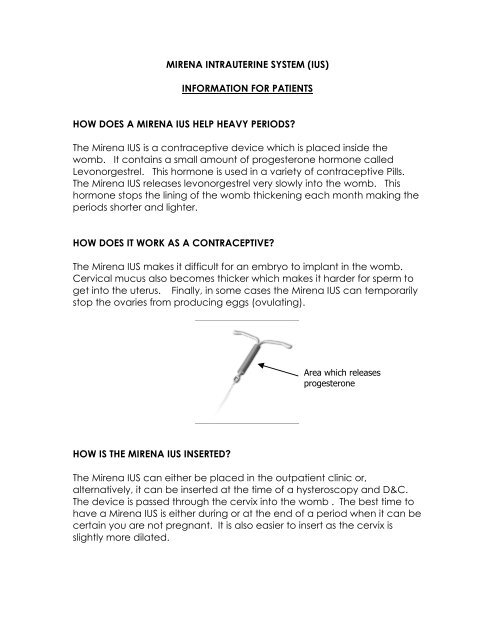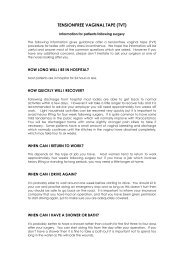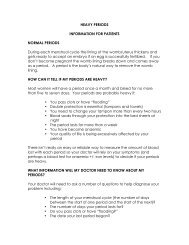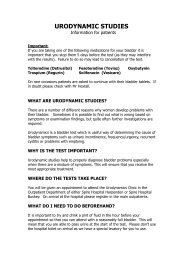MIRENA INTRAUTERINE SYSTEM (IUS ... - HertsGynae
MIRENA INTRAUTERINE SYSTEM (IUS ... - HertsGynae
MIRENA INTRAUTERINE SYSTEM (IUS ... - HertsGynae
Create successful ePaper yourself
Turn your PDF publications into a flip-book with our unique Google optimized e-Paper software.
<strong>MIRENA</strong> <strong>INTRAUTERINE</strong> <strong>SYSTEM</strong> (<strong>IUS</strong>)<br />
INFORMATION FOR PATIENTS<br />
HOW DOES A <strong>MIRENA</strong> <strong>IUS</strong> HELP HEAVY PERIODS?<br />
The Mirena <strong>IUS</strong> is a contraceptive device which is placed inside the<br />
womb. It contains a small amount of progesterone hormone called<br />
Levonorgestrel. This hormone is used in a variety of contraceptive Pills.<br />
The Mirena <strong>IUS</strong> releases levonorgestrel very slowly into the womb. This<br />
hormone stops the lining of the womb thickening each month making the<br />
periods shorter and lighter.<br />
HOW DOES IT WORK AS A CONTRACEPTIVE?<br />
The Mirena <strong>IUS</strong> makes it difficult for an embryo to implant in the womb.<br />
Cervical mucus also becomes thicker which makes it harder for sperm to<br />
get into the uterus. Finally, in some cases the Mirena <strong>IUS</strong> can temporarily<br />
stop the ovaries from producing eggs (ovulating).<br />
Area which releases<br />
progesterone<br />
HOW IS THE <strong>MIRENA</strong> <strong>IUS</strong> INSERTED?<br />
The Mirena <strong>IUS</strong> can either be placed in the outpatient clinic or,<br />
alternatively, it can be inserted at the time of a hysteroscopy and D&C.<br />
The device is passed through the cervix into the womb . The best time to<br />
have a Mirena <strong>IUS</strong> is either during or at the end of a period when it can be<br />
certain you are not pregnant. It is also easier to insert as the cervix is<br />
slightly more dilated.
HOW EFFECTIVE IS IT FOR TREATING HEAVY PERIODS?<br />
The Mirena <strong>IUS</strong> is very effective for most patients with about 70-80% of<br />
women finding that it has helped their heavy periods. After<br />
approximately three months use, the average blood loss is 85% less and<br />
around one third of ladies will stop having periods altogether. This is not a<br />
problem because the lining hasn’t thickened up during the month and<br />
there is nothing to come away.<br />
HOW LONG DOES THE COIL LAST FOR?<br />
The Mirena <strong>IUS</strong> can be left in place for up to five years and then needs to<br />
be replaced.<br />
WHEN CAN I RELY ON IT FOR CONTRACEPTION?<br />
The coil is effective immediately and no other contraception is required.<br />
HOW EASY IS IT TO REMOVE?<br />
There is a small string at the end of the coil which comes out through the<br />
cervix. Removal involves passing a speculum into the vagina and then<br />
removing the coil by pulling on the string. There is slight discomfort for<br />
one to two seconds.<br />
HOW MUCH DOES IT COST?<br />
The Mirena <strong>IUS</strong> costs around £90-£100.<br />
does, of course, last for five years.<br />
Although this sounds expensive it<br />
CAN IT BE USED IF I HAVE FIBROIDS?<br />
The Mirena can be used if there are only small fibroids within the womb. If<br />
there are large fibroids, then this may distort the shape of the uterine<br />
(womb) cavity making it difficult to place the Mirena coil properly.<br />
WHAT HAPPENS WHEN THE <strong>MIRENA</strong> COIL IS REMOVED?<br />
When the coil is taken out, it is quite likely that you will revert back to your<br />
normal bleeding pattern and, of course, your periods may continue to be<br />
heavy. Fertility returns very quickly but it is probably best to wait for your<br />
next period before trying for a pregnancy so that it is easier to work out<br />
how far on you are when you do fall pregnant.
WHAT ARE THE SIDE EFFECTS?<br />
1. Irregular periods.<br />
It takes approximately two to three months for the Mirena <strong>IUS</strong> to work for<br />
most ladies. During this time it is very common to have some slightly<br />
irregular bleeding which may be on a daily basis initially. The bleeding<br />
settles down with time in most patients but unfortunately a few continue<br />
to have a persistent, troublesome light period or some discharge.<br />
2. Expulsion.<br />
There is an extremely small chance that the coil could come out,<br />
particularly if the periods remain heavy. If it is being used for<br />
contraception then the coil should be checked after each period to<br />
make sure it is still in place. This is done by self examination - if the string<br />
can be felt coming out through the cervix then it is still in position. If there<br />
is any doubt then an examination should be performed by your doctor or<br />
practice nurse.<br />
3. Hormonal problems.<br />
The main advantage of the Mirena <strong>IUS</strong> over tablets is that the<br />
progesterone hormone is delivered directly onto the lining of the womb -<br />
only a very small amount gets absorbed into the body. This tends to<br />
reduce the risk of hormonal side effects. However, in some ladies this can<br />
cause some water retention/bloating. Premenstrual tension (PMT) can<br />
also be a concern for a minority of women although this tends to get<br />
better with time.<br />
4. Pelvic infection.<br />
Although most normal coils increase the risk of pelvic infection, this does<br />
not seem to be the case with a Mirena coil.<br />
5. Contraceptive failure.<br />
The Mirena <strong>IUS</strong> is an extremely effective form of contraception. If 1000<br />
women used a Mirena <strong>IUS</strong> for a year, only one would fall pregnant<br />
compared to about ten for the normal coil or 20 for the Pill. As with all<br />
coils, if it does fail there is a higher risk of ectopic pregnancy. If you fall<br />
pregnant then it is important to see your doctor to rule out an ectopic<br />
pregnancy.<br />
Our contact details are as follows:<br />
Telephone: 01727 730892 Secretary (Margaret Hughes)<br />
Fax: 01727 859346<br />
Email: Margaret@hertsgynae.com.<br />
www.hertsgynae.com Andrew Hextall – August 2008





